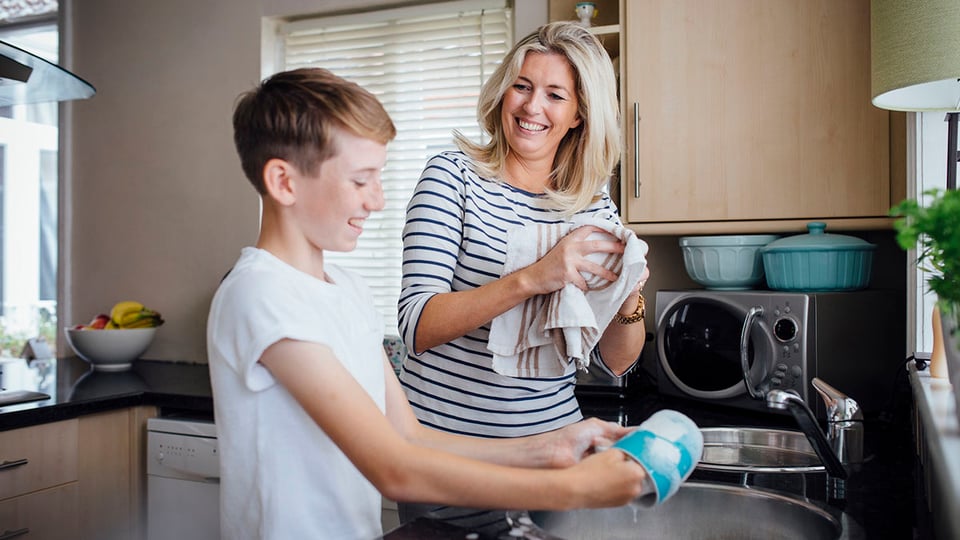Parenting 101: Just How Do You Parent Anyway?
A parent’s primary job is to prepare children to live independently as adults. How? Read on to learn two principles for parenting kids to become good adults.

If there were a course on how to parent that guaranteed success, I wonder how many parents and soon-to-be parents would actually take it. The fact is, it’s impossible to avoid all the hard knocks of being a parent, because all the book knowledge in the world doesn’t fully prepare you for the reality. To really learn to parent, you have to be a parent.
But that doesn’t mean you shouldn’t prepare. And whether you’re in the pre-parenting stage or dealing with obstinate teens, it’s never too early or too late to learn solid, time-tested parenting principles.
Consider these two principles that parents need to consciously instill in their children to equip them for adulthood.
1. Responsibility
Responsibility isn’t common these days. Kids generally seem to be uninterested unless something’s fun, entertaining or easy. Yet part of preparing children for adulthood is teaching them that life isn’t all about fun and games or getting our way; there are a lot of things we do out of responsibility—even when we don’t feel like it. Things like cooking dinner, mowing the lawn, paying bills and cleaning aren’t always fun, but they need to be done.
When kids are little, they often want to help. They will follow Mommy around, wiping up messes, dragging a toy vacuum around the floor and generally getting in the way. As they get older, however, the desire to help diminishes unless parents have cultivated it. Small, basic jobs help children learn the importance of responsibility and should be assigned beginning when children are small and continued consistently throughout their childhood.
Here are some ideas for teaching responsibility to your children.
- Have realistic expectations. Set the bar high, but not so high that it exceeds your child’s abilities.
-
Responsibilities can help teach the values of contributing to the greater good, respecting others, service and how the real world works.
Use tasks to teach life lessons. For instance, responsibilities can help teach the values of contributing to the greater good, respecting others, service and how the real world works. - Set up a routine. Kids need predictability. Giving children daily, weekly and/or monthly chores teaches them the importance of the routine nature of responsibility.
- Make responsibilities personal and varied. Kids need to connect with the value behind the chore—to understand the benefits for them as well as for others. Rotating out different tasks creates competence in several areas. An organization called Empowering Parents provides various downloadable charts that can help in these areas.
2. Accountability
Being personally responsible for one’s actions is hard, even for adults. Without accountability, we blame others, justify our poor choices and refuse to do things that seem unfair or unfun. Good parents work to create a culture of accountability within the home, starting with themselves. This teaches children that every choice has consequences and that there are rules and expectations that apply to everyone.
Here are some ideas to help parents teach accountability.
- Positive and negative consequences. Use positive consequences (rewards) to encourage right behavior, and negative consequences (discipline) to discourage wrong behavior. Rewards should be used carefully and temporarily because they shouldn’t be the main motivation for responsibility.
- Consequences should be consistent and effective. Find out what motivates your child: Two primary things kids want are time (to do things they enjoy) and freedom (to choose how they will spend that time). Using age and maturity as a factor, strong motivators can include having access to electronic devices, spending time with friends, using the car, participating in unchaperoned events and the opportunity to earn money.
- Teach your children the concept of earning their free time. Like a bank account in which deposits are made, rewards can directly correlate to completed responsibilities. For instance:
- Homework done: 30 minutes earned.
- Bedroom clean: 20 minutes.
- Dishwasher unloaded: 10 minutes.
Powerful tools
There are no shortcuts to raising great kids. But there are time-tested principles you can instill in your child—and the principle of cause and effect is a major one! Shielding your children from the cause-and-effect reality of life only sets them up for difficult times later. But teaching responsibility and accountability will give you the confidence to know your child is ready to stand on his or her own two feet when the time comes.
For more insight about parenting, read “Helping Our Children Grow” and “Teaching Little Kids About Money.”
Read part 3 of this series: “Parenting Challenges: One Couple’s Journey.”
Read part 1 of this series: “Parenting 101: Four Phases of Parenting.”
Date Posted: August 7, 2017



